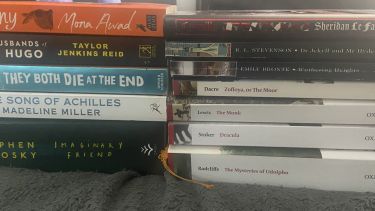Battle Royale: The Classics vs Contemporary
This is a topic I have been pondering for a while now, that being the debate surrounding classical texts versus contemporary works. It is a commonly upheld notion that the classics are preordained to be highly regarded as infallible works of brilliance.
The Debate
Nobody disputes the genius or literary authority of Shakespeare, Homer, Dickens or Orwell, but many would halt to allow the same respect to King, Morrison, McEwan or Atwood. Why is that? Why is it, that as a society, we have decided that greatness has already been reached, achieved and cemented? To be labelled contemporary is to be given a death sentence in the literary world. Scholars have decided what is in the canon and what is excluded from it, and that is deeply problematic. However, on the other side of things, the younger generation of readers, are hostile to the presence of the classics. They groan, yawn, and skim over the texts placed before them in lessons with no inspiration. The classics have a bad reputation and the contemporary is being shunned. We have divided the literary world and we need to come to an alliance before we divide to the point of no return. Personally, I love both, I can sit down and enjoy Jane Eyre with the same enthusiasm as a fresh Sally Rooney. Therefore, as a loyal defender of both parties, I will singlehandedly lead the debate in defending both the classics and the contemporary.
The Issue
The culture of book consumption within academia and society is flawed. In seminar discussions regarding a person’s favourite novel, many are quick to name drop as many classic pieces of literature as they can and stay away from the contemporary like it is a disease. The fact of the matter is that the classics produce prestige while your favourite John Grisham novel does not. There is an overwhelming belief that books of the recent decade cannot impart the same wisdom, knowledge and societal truths as the classics can. Books written within the recent decade are considered, ‘fluff material,’ devoid of real substance or authenticity but rather consumed passively as a form of entertainment. Perspectives such as these are problematic for a multitude of reasons, for one they devalue the impact and strength of novels written in the recent millennium and secondly they wrongfully assume that classics cannot be read for enjoyment. Reading is for enjoyment, finding books as an escape from the monotony and drudge of everyday life is not something to be ashamed of or trivialised. A person can open Odyssey and experience the same thrill as someone reading a King novel. Reading is subjective and so is taste. As readers we have created an unfair narrative for classics readers and contemporary readers; people who say they love reading the classics gets brandished as ‘pretentious’ and seek prestige, whereas contemporary readers are often belittled for their taste and treated as if they are childish. No matter the genre, period or category, reading should be a source of enjoyment.
A Defence for Classics
The classics are given the title for a reason, written during periods of strife and sorrow, the classics are works of art that have stood the test of time. The isolating world of Jane Eyre, the racial injustice of To Kill a Mockingbird and the surveillance state of Catch-22, all of these are narratives that still resonate with readers of today as they did with readers of their time. In the classics, writers are unencumbered with the limits of a busy society and thus they are written in a breath of gorgeous words and sentences. The classics take time to read and digest because they were comprised during a time when people had time to absorb literature and allow themselves to become undistracted. The classics require your undivided attention, but they promise to impart you invaluable wisdom. With the classics we can unpick the realities of the past and understand the commentary on the world the author is dissatisfied with; often at times, we might even identify similarities in our world.
Recommendations:
Wuthering Heights by Emily Brontë
Dracula by Bram Stoker
Little Women by Louisa May Alcott
The Tenant of Wildfell Hall by Anne Brontë
Frankenstein by Mary Shelley
A Defence for Contemporary
The beauty of contemporary literature lies in the endless supply of texts as well as the diversity of subject, character and plot. In contemporary literature, you can delve into a world of mysticism, find characters that represent you and introduce younger generations to complex personal problems. With contemporary literature, the modern world is mapped out and showcased in all its glory and modernity. Queer love, minority representation and immigration are no longer cases of subversion or revolution but rather reflect a world of tolerance and acceptance. Contemporary literature is also inclusive of issues that were restricted in the times of the classics. Novels are written with the language of the people of now in mind, complex syntax, lexis and word structure is no longer an issue, even the most reluctant readers can find books that entice and speak to them.
Recommendations:
Cradle and All by James Patterson
The Seven Husbands of Evelyn Hugo by Taylor Jenkins
Reid Daughters onto Devils by Amy Lukavics
These Shallow Graves by Jennifer Donnelly
Half Bad by Sally Green
Results?
Read whatever makes you happy. That's it! Reading is not a game of who appears more intellectual or what is acceptable and what isn't. Reading is a personal experience and the value of the text lies in the reader. Whether you are more drawn to the classics or the contemporary, take pride in the fact that you are reading. That’s all!
Written by Valentia Adarkwa-Afari, Digital Student Ambassador, on 10 March 2022.

